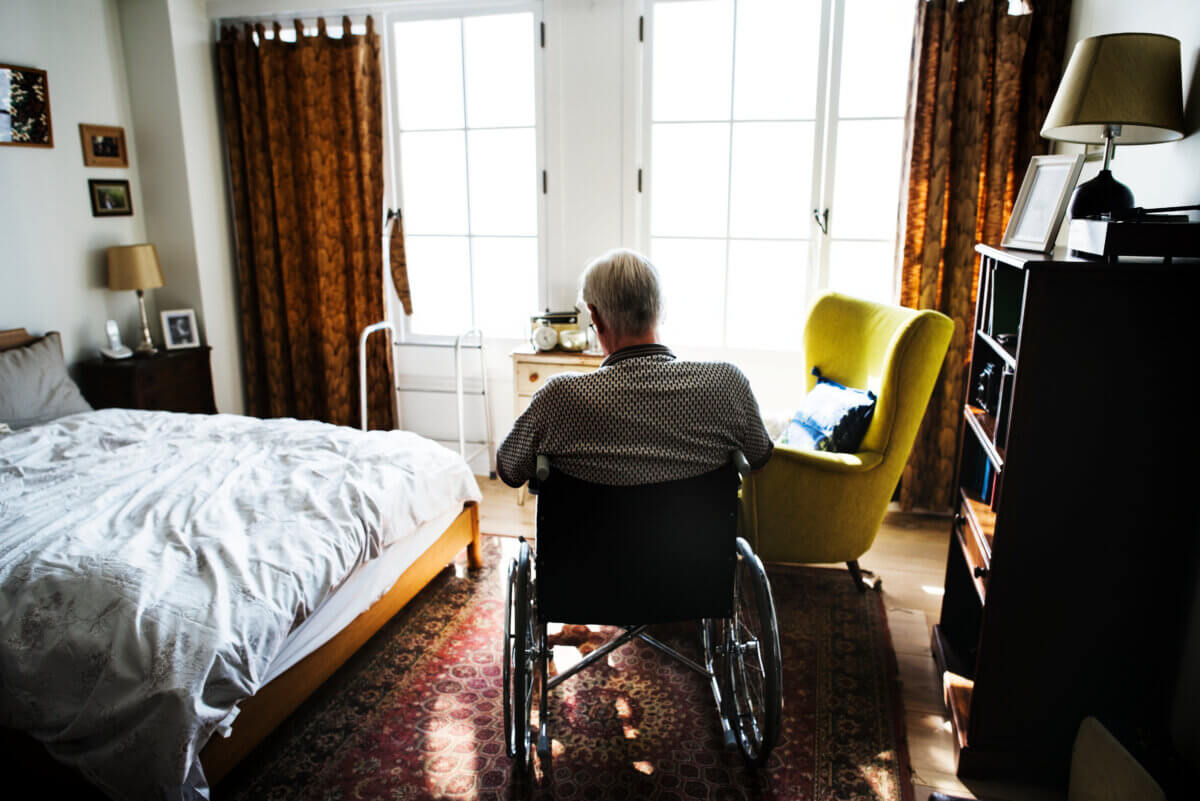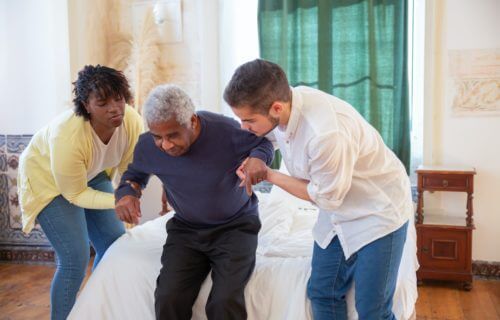AURORA, Colo. — What’s the average age of a person entering long-term care? Researchers from the University of Colorado Anschutz Medical Campus now have an answer to this difficult question — as well as how long older adults will likely live with a disability before opting for a nursing home. It turns out the number is now 84 years-old, usually preceded by months of both severe disability and escalating caretaking by the person’s loved ones at home.
As a geriatrician, or physician specially trained to treat older adults, Kenneth Lam, MD, MAS, has spent years working with families to determine when it’s time for older relatives to move into a nursing home or assisted living facility, as well as what kind of specific services they’ll need.
“They might be deteriorating and becoming less able to care for themselves, and the family members would ask us, ‘Where do you think this person should go? What services should they get? Should they move into an assisted living facility, or should they move into a nursing home?,’” says Lam, assistant professor of geriatric medicine in the University of Colorado School of Medicine, in a media release. “In my clinical practice, I had honed a sense of where people belong, but as I started to move into research, it kept bothering me: This is a really big decision, and I had never seen any data around it.”
So, Dr. Lam set out to finally provide some relevant data in a new study. More specifically, the research focuses on the ages at which people enter care facilities, as well as their disability levels prior to entry.
“I learned about a dataset called the National Health and Aging Trends Study, which follows older people every year and asks questions like, ‘Can you get dressed on your own? Can you get around in your home on your own?,’” Prof. Lam explains. “It also asks questions like, ‘How many people help you? How many hours of help are they giving you?’ Those were exactly the questions I was asking — how independent are people before they go into a facility, and how much help do they tend to get? What does the process leading up to that point look like?”
Scroll down to see the step-by-step process of entering a nursing home

Dr. Lam also calculated that the average person moving into a nursing home is already severely disabled, and typically receiving about 27 hours a week of care for at least one month. Severe disability refers to major difficulties performing daily tasks or if someone is already assisting them with three activities of daily living (getting dressed, bathing, and moving around inside their home). Older adults moving into assisted living were less likely to be severely disabled but still received 18 hours a week of care.
“Clearly, many people are providing a lot of care at home, and also dealing with severe disability at home, for months or years before these people move into nursing homes,” the researcher comments. “It’s less of an issue for people moving into assisted living facilities, and that might reflect the sociodemographic advantages of people who tend to move into assisted living facilities.”
Dr. Lam notes one of his more interesting discoveries was that among those moving into assisted living facilities, levels of severe disability approached those of nursing home residents within one to two years.
“There’s been a lot of discussion of late saying, ‘What is the interrelationship between assisted living and nursing homes?’,” he says. “The data show that after a few years, people who moved into assisted living start to look much more like people who moved into nursing homes. This leads to more questions: Should people stay at assisted living facilities forever, or do we need to have upfront conversations about what care might look like in those places a couple of years down the line?”

(© M. Business – stock.adobe.com)
Dr. Lam adds that the data indicates nursing home entry tends to happen late in the course of disability. “Everyone wants to know why,” he continues, “but that’s a much harder question to answer.”
It may be because of stigma. Many people are afraid of what will happen to their relatives once they enter these facilities. Affordability is another major factor.
“You have to have a low enough income and low enough assets to qualify for nursing home coverage; otherwise you have to pay out of pocket. Most people can’t afford that,” he says. “These data give a picture of the moment when people and society has decided to make this trade off — when they say, on average, ‘I can’t do this anymore, now you get help.’”
Dr. Lam plans to follow up on the quantitative study with some qualitative research by interviewing people who have recently moved into nursing homes or assisted living. He hopes this will lead to greater insights regarding the circumstances of their entry, how it changed their social lives, and what advice they may want to give to other people in the same situation. He is also considering the role of dementia in such decisions.
“I knew this was a really big decision that was really important to people,” he says. “I felt it deserved more robust research, rather than just my advice and opinion.”
Now that his report has been published, Dr. Lam hopes it can serve as a starting point for clinicians, patients, and families as they weigh options around long-term care for older individuals. “Too early” and “too late” are terms relative to each person’s individual situation, he stresses, but this research helps set a general timeframe for when one can start having conversations.
“Now we know at what age people move in, on average, and from there you can start to define what it means to move in early or move in late,” he concludes. “The next step is to figure out if moving in early or moving in late makes a difference, and if so, a difference in what? That is an important and different question. It’s a tricky problem, and this paper is trying to open up the discussion around it.”
Steps to Entering a Nursing Facility
The process of entering a nursing home can vary depending on the state in which you live, but there are some general steps that are typically the same across the country.
- Determine your need for nursing home care. Before you can be admitted to a nursing home, you must first meet the state’s criteria for nursing home care. This means that you must have a medical condition that requires 24-hour skilled care and that cannot be adequately met at home. You can talk to your doctor or a social worker to determine if you meet the criteria.
- Research nursing homes. Once you have determined that you need nursing home care, you should start researching different nursing homes in your area. You can use online resources, such as Medicare.gov or A Place for Mom, to compare nursing homes and read reviews from other residents and families.
- Schedule tours. Once you have narrowed down your choices, you should schedule tours of the nursing homes that you are interested in. This will give you a chance to see the facility for yourself and meet the staff.
- Apply for admission. Once you have found a nursing home that you are comfortable with, you will need to apply for admission. The application process will vary from nursing home to nursing home, but will typically require you to provide information about your medical history, financial situation, and insurance coverage.
- Complete a preadmission assessment. Once your application has been approved, you will need to complete a preadmission assessment. This assessment will be conducted by a nurse or other healthcare professional and will help to determine your level of care needs and develop a care plan.
- Move in. Once the preadmission assessment is complete and you have signed the admission agreement, you are ready to move into the nursing home.
The study is published in JAMA Internal Medicine.
You might also be interested in:
- Young adults facing financial ruin as they care for aging loved ones
- Not ready for the end: 2 in 3 seniors have no plan for their elder care
- Best Orthopedic Shoes For Women: Top 7 Supportive Styles, According To Podiatrists


I aint ever going!
Says everyone, that forgets they said that. And BOOM in a nursing home!
I agree! If I get that bad a good swim to Maui would fix the problem.
Nobody is going, until they have to.
I hope neither of us has to go.
Once upon a time families took care of each other. Now, you have kids, work hard to raise them and educate them, they go off on their own and let the government take care of you when you are old and sick after they have cared for their kids. Our culture is sick. We are doomed. I don’t think their is any other country that discards their parents as we do.
Very sad to live in assisted living or an LTC facility. Did they study the impact of receiving additional care have on the individual’s ability to do for themself. If they have other people do more for them, then the lose the individual motivation to do for themself.
I’m not there yet, but I live alone and no relatives close by. What will happen to me over the next 10-20 years? I can do all of the ADLs, it just takes me more time and I have to pace/plan what I do every day but my stuff gets done.
I always told myself I would never go in a “home”; I’d rather crawl around or push myself on a little skate sled rather than go to a home. I’m planning on moving in the next 6 months and my next house will have wide hallways, one level and no stairs so I can move around under my own power and avoid falls.
I am 88 and living independently in my home of 62 years. I still drive, eat healthy food, and exercise. In August, I buried my 95-yr-old husband who was nursing home bound for 5 years. He had a stroke in 2018, and suffered mild dementia. I hope and pray I will NEVER go to one of those places!
The average American doesn’t live to 84.
Due to the lack of basic health care and the probability of being shot and killed, American lifespans are in rapid decline.
That makes me laugh.
Your words show you to be exactly the kind of person most people would dread to be anywhere near, especially in a nursing home. Quite probably you would be so disliked that somebody might smother you with a pillow. However you do die, I expect that you will rot in H*ll.
Well.. my mother-in-law is 88 years old. She’s still mobile and loves to cook for the entire family. I am talking enough food to feed my two brother-in-laws’ families, my sister-in-law, and our family.
Last night she asked my wife to drive by after work and pick up beef stew that she made us.
The key is you need to stay active.
She lives in her own house which a double decker and my sister-in-law lives in the 1st floor apartment.
Also you need to do something to stay occupied. Recently her hands started to lock up, she went for carpal tunnel surgery and now she’s fine. The key is staying active! Go for walks. My mother in law loves to build puzzles too, so that’s what my sons get her for her birthday and christmas every year. I am talking large puzzles that take up an entire dining room table. She never got her driver’s license. She walked to most places, including church, until now. Now my sister-in-law drives her there.
So if you don’t want to end up in a nursing home… get active! Don’t just sit around and watch tv.
sure you can set aside time to watch tv but don’t just sit there 10hrs / day… get a hobby. Go to the park. Don’t eat fast food. For those of you that claim you have to have money to have a long life, the answer is no. My mother-in-law is a Portuguese immigrant and she was employed as a seamstress. My father-in-law was a textile mechanic. They both worked very hard.
Never make it now, due to vaxxes. When detergents, washing machines, and sewers were introduced in America, life spans SKYROCKETED to 72 by 1920! By 1932, vaxxes were introduced, and “modern” cancers, autism, auto-immunes, chronics, etc, EXPLODED!!!!!!!!!!
and the life span curve ABRUPTLY started DOWNWARD again to 59, where it is now.
SALK WARNED EVERYONE that the monkey kidneys carrying simian AIDS was a “problem”…
by 1980, fauci “turned it up”, and Dr. Judy blew the whistle-she’s an ANGEL!!!
Regarding 2023 life expectancy, see https://www.statnews.com/2023/11/13/life-expectancy-men-women/
“The picture is especially concerning for men, whose life expectancy is now 73.2 years, compared with women’s 79.1. This 5.9 year gap is the widest between the two genders since 1996.”
I hope to die before I am forced to go to a nursing home. I dread the idea of living in a nursing home because I do not especially enjoy social interaction, and in a nursing home, it is very hard to avoid it. My father entered a nursing home at age 85, and he had a roommate. Both of them were jammed into a room with just enough space for two beds and two bedside chairs. And the roommate was a jerk. This is would be my idea of Hell.